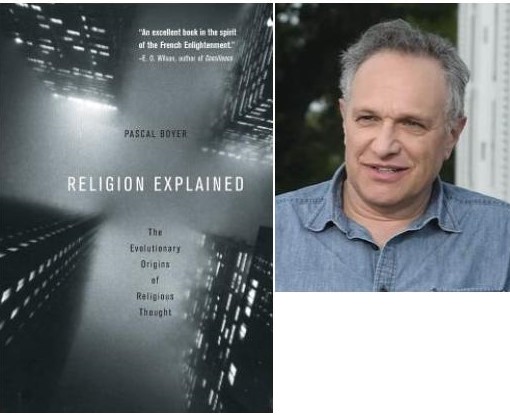 This post is an interlude, a necessary detour in our series on God and why people believe in God. In that series we have limited our focus to four fundamental mental tools or devices: naive physics, naive biology, agent detection, theory of mind. Before continuing that series I think it a good idea to backtrack and introduce another tool, this one is our moral intuition device. I quote passages from Pascal Boyer’s Religion Explained: The Evolutionary Origins of Religious Thought.
This post is an interlude, a necessary detour in our series on God and why people believe in God. In that series we have limited our focus to four fundamental mental tools or devices: naive physics, naive biology, agent detection, theory of mind. Before continuing that series I think it a good idea to backtrack and introduce another tool, this one is our moral intuition device. I quote passages from Pascal Boyer’s Religion Explained: The Evolutionary Origins of Religious Thought.
We all have moral intuitions (“My friend left her purse here, I must give it back to her”), moral judgements (“He should have returned his friend’s purse”), moral feelings (“He stole his friend’s purse, how revolting!”), moral principles (“Stealing is wrong”) and moral concepts (“wrong”, “right”). How is all this organized in the mind?
Two possible answers have long been proposed:
-
- the moral reasoning model: people seem to have some very general set of rules (e.g. “do not hurt others unless they hurt you”)
- the moral feeling model: many times people seem to simply have a feeling that an action is wrong and blameworthy, or that another action is praiseworthy
But most psychologists say that the opposition between the two models is overstated:
The emotions themselves are principled, they occur in a patterned way as the result of mental activity that is precisely organized but not entirely accessible to consciousness. If this is the case, then the explicit moral principles are optional. They are a possible interpretation of our common intuitions and feelings, rather than their cause.3
That note #3 points to The Moral Sense by James Q. Wilson. Here is an excerpt. Wilson is responding to the common idea that there is no such thing as a universal moral sense. He disagrees, suggesting that what is fundamental and universal is a moral disposition as distinct from specific rules:
I am reckless enough to think that many conducting this search have looked in the wrong places for the wrong things because they have sought for universal rules rather than universal dispositions. It would be astonishing if many of the rules by which men lived were everywhere the same, since almost all rules reflect the indeterminate intersection of sentiment and circumstance. Rules (or customs) are the adjustment of moral sensibilities to the realities of economic circumstances, social structures, and family systems, and one should not be surprised to find that the great variety of these conditions have produced an equally great variety in the rules by which they are regulated. There is a universal urge to avoid a violent death, but the rules by which men seek to serve this urge require in some places that we drive on the right-hand side of the road, in others on the left-hand side, and in still others that we give the right of way to cows. Infanticide, as we saw in the first chapter in this book, has been tolerated if not justified at some time and in some places, depending on the ability of parents to feed another child or cope with a deformed one. Even so, some universal rules have been discovered: those against incest, for example, or against homicide in the absence of defined excusing conditions.
Are There Moral Universals?
To find what is universal about human nature, we must look behind the rules and the circumstances that shape them to discover what fundamental dispositions, if any, animate them and to decide whether those dispositions are universal. If such universal dispositions exist, we would expect them to be so obvious that travelers would either take them for granted or overlook them in preference to whatever is novel or exotic. Those fundamental dispositions are, indeed, both obvious and other-regarding . . . . (Wilson)
Boyer makes an interesting application of this approach to our famous “golden rule”:
This explains why it is extremely difficult to elicit general moral principles in many places in the world. For instance, the Fang find the explicit principle “Do unto others as you would have them do unto you” so vague and general that it is virtually meaningless. But these people are certainly not immoral; far from it. They constantly talk about this action being right and that one wrong, as is true of every human group. (Boyer, 175)
 Boyer continues with a comparison to music intuitions and cultures:
Boyer continues with a comparison to music intuitions and cultures:
So an abstract moral code, with principles and deductions, may well be a cultural artifact like a writing system or a musical notation. People everywhere have specific musical intuitions, they judge that this or that chord, given the parameters of their musical tradition, is felicitous or not; but it is only in some cultures that people write treatises on harmony to describe these intuitions in a more systematic way. That people have principled moral feelings without explicit moral principles would explain why cross-cultural studies of explicit moral reasoning give very confusing results. There are places where such reasoning is familiar and places where people find it baffling.
If our moral intuitions are derived from moral reasoning then we may conclude that immoral people have a low level of moral reasoning ability. But that’s not what studies of sociopaths indicate. They know very well what is wrong.
Now the clinical study of sociopaths suggests . . . these people have no difficulty describing what they did or what they were planning to do as violating moral rules—for instance, as hurting people without justification. If anything, some criminal sociopaths seem to have a very keen sense of what is wrong and why, and they often entertain precise descriptions of the effects their actions will have on others.
Early Morality
Let’s look at what is going on in our brains before we acquire sophisticated language skills to presumably explain, codify or confuse the innate disposition within us — at six years of age:
Six-year-olds, like adults, have the intuition that it is wrong to lie, or rather, that it is wrong to communicate information (either true or false) with the intention of deceiving someone. However, young children also tend to use the word “lie” in the narrow sense of “communicating false information,” which is why they would sometimes call a genuine mistake a lie, and conversely fail to identify as a lie an elaborate deception that used only true information. Their moral concept of “lying” is quite similar to the adults’ but their use of the word does not correspond to that concept. You will not understand their moral judgements if you just ask them explicit questions such as “Is it wrong to lie?” because of this discrepancy, which may extend to other moral concepts as well.
Enter Elliot Turiel and learning that even young children have sophisticated moral understandings. He began with seeking to find if young children distinguished between violations of moral principles (e.g. hitting people) and violations of conventional rules (e.g. chattering while the teacher is talking). If the teacher did not insist on silence then there is no convention and no offence. Moral violations would be violations even in the absence of clear instructions.
Turiel found that even some three- and four-year-olds have the intuition that hitting people would be wrong both in those contexts where it had been explicitly forbidden and in those where there was no prohibition. On the other hand, shouting in class is perceived to be wrong only if there was an explicit instruction to keep quiet. Slightly older children (but still as young as four or five) also have precise intuitions about the relative seriousness of various violations. They can perceive that stealing a pen is not quite as bad as hitting people; in the same way, shouting in class is only a minor violation of convention, whereas boys wearing skirts would violate a major social convention. But they find it much easier to imagine a revision of major social conventions (e.g., a situation where boys would wear skirts) than a revision of even minor moral principles (e.g., a situation where it would be all right to steal an eraser). Also, children differentiate between moral principles and prudential rules (e.g., “Do not leave your notebook next to the fireplace!”). They justify both in terms of their consequences but assume that social consequences are specific to moral violations.
Other studies have pointed towards the universality of such intuitions. Studies thus . . .
-
- in North Korea and America produced similar results
- show newcomers to kindergarten were as strict or even more strict than those who had been enrolled longer in such a schooling context
- show similar results among neglected and abused children as among those with a relatively stress-free existence
So experimental studies show that there is an early-developed specific inference system, a specialized moral sense underlying ethical intuitions.
Even very young children know the difference between moral imperatives and social conventions.
Further, having principled moral intuitions does not mean that one can articulate them explicitly.
But the intuitions or moral judgements will sometimes change as the children mature. Children do not have the same sophisticated grasp of how others feel or what they think or believe as adults. Intuitive psychology “requires a lot of fine-tuning before it can provide reliable descriptions of mental statements of other people.” Children will acquire over years of experience and growth different ways in which others can be hurt in particular social contexts. And so forth.
Despite these differences, it is quite striking that some important aspects of reasoning do not really change with development. Our moral intuitions specify that behavior is either right or wrong or morally irrelevant; that whether we are able to justify our intuition by invoking abstract principles is irrelevant; that a course of action is in actual fact right or wrong regardless of how the agents themselves explain their behavior. If you think that stealing a friend’s pen is wrong, you think it is wrong not just from your viewpoint but also from anyone else’s viewpoint. Whether the perpetrator of this minor offense can invoke self-serving excuses or not is completely irrelevant. Whether the owner of the pen minds the theft or not is equally irrelevant. . . .
As we mature and learn to live in social groups we increase our understanding of the viewpoints of others. But something about our “intuitive moral toolkit” does not give passes to other points of view when it comes to moral judgments.
For the three-year-old as well as for the ten-year-old and indeed for most adults, the fact that a behavior is right or wrong is not a function of one’s viewpoint. It is only seen as a function of the actual behavior and the actual situation.
Now this post has merely skimmed the surface of the topic. There is much more in the literature that delves into all the “exceptions to the rules” and trade-offs that always need to be assessed in cooperative groups vis a vis other groups or individuals. The point has been to provide some background to the next post that picks up Justin Barrett’s discussion of how gods and moral thinking come together. Further discussion that seeks to account for hypocrisy, exceptions, and so-forth are in the bibliography and many other works of cognitive anthropology.
Boyer, Pascal. 2002. Religion Explained: The Evolutionary Origins of Religious Thought. New York: Basic Books.
Wilson, James Q. 1997. The Moral Sense. New York, NY: Free Press.
Neil Godfrey
Latest posts by Neil Godfrey (see all)
- What Others have Written About Galatians (and Christian Origins) – Rudolf Steck - 2024-07-24 09:24:46 GMT+0000
- What Others have Written About Galatians – Alfred Loisy - 2024-07-17 22:13:19 GMT+0000
- What Others have Written About Galatians – Pierson and Naber - 2024-07-09 05:08:40 GMT+0000
If you enjoyed this post, please consider donating to Vridar. Thanks!



Boyer is naive. “The emotions themselves are principled, they occur in a patterned way as the result of mental activity that is precisely organized but not entirely accessible to consciousness.”
A psychologist would need to presume ’emotions are principled’ and ‘mental activity is precisely organized’ just to get started. Bugaboo of that old Enlightenment faith in the existemce of ‘Laws of the Mind’ (!)
Mental activity is not precisely organized, nor are emotions principled, however…..
Anachronistic rationalism….
You dispute the findings of the research in the moral intuitions of young children for starters?